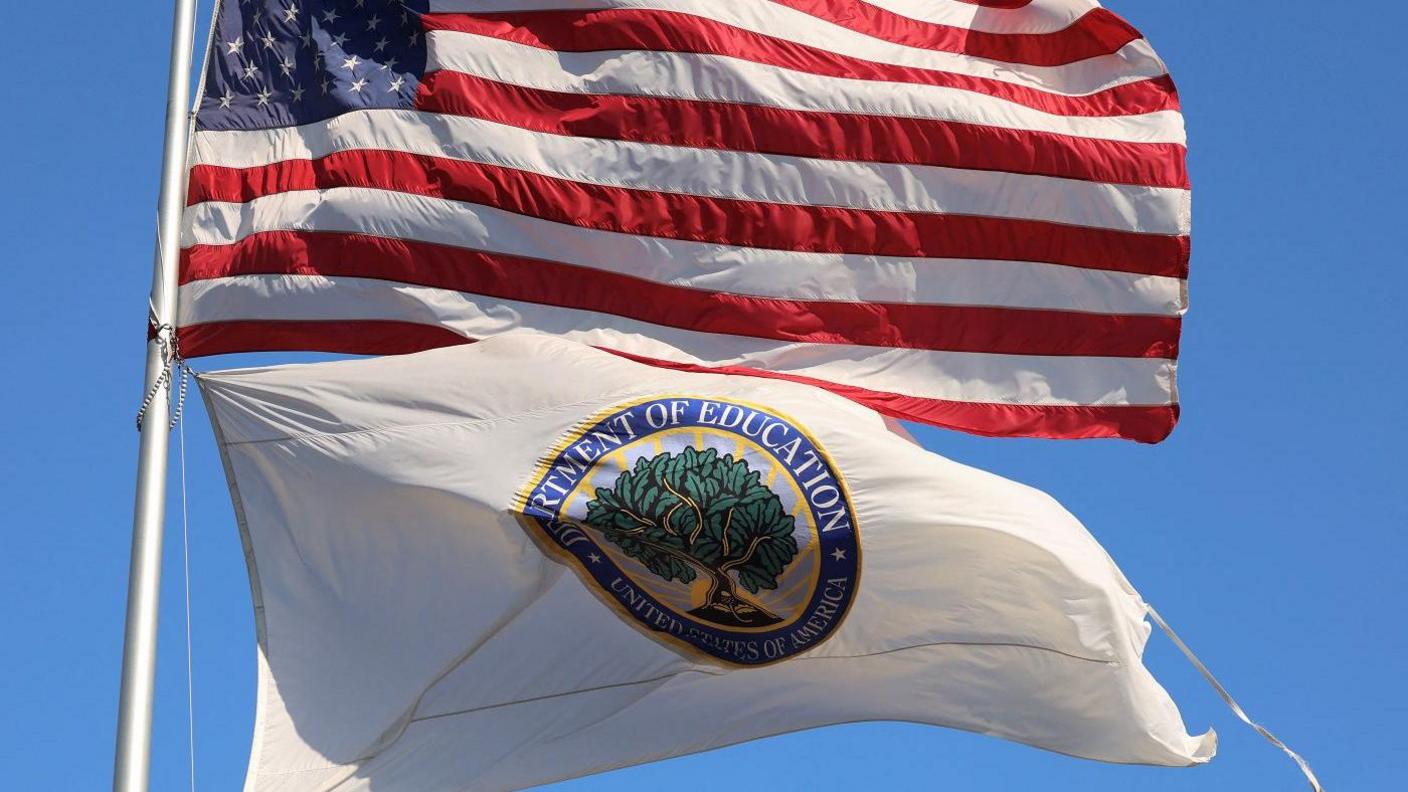What does the US education department do - and can Trump truly dismantle it?

- Published
One of President Donald Trump's top aims is to dismantle the Department of Education, and in the opening days of his second term he signed an executive order to begin taking apart the agency that administers student loans for thousands of borrowsers, runs programmes to help low-income children, and oversees some funding for public schools.
Trump is now one step closer to his goal after the Supreme Court ruled on Monday that his administration could move ahead with plans to lay off half the department's workforce, more than 1,000 people.
The six conservative justices on the court, three of whom were appointed by Trump, voted to stop a lower court judge's order that had blocked the firings. The three liberals dissented.
On social media, Trump called the ruling a "major victory" for both parents and students that would pave the way to carrying out his executive order, saying Education Secretary Linda McCmahon could now "begin this very important process".
Trump and his allies have accused the department of indoctrinating young people with racial, sexual and political ideologies.
Conservatives, though, have long sought to eliminate the department, almost from the moment it was established in 1979. A complete shuttering would most likely have to involve Congress, and so Trump's approach has been to dramatically shrink its reach and capacity.
What does the department do - and not do?
A common misconception is that the Department of Education operates US schools and sets curricula - that responsibility actually belongs to states and local districts.
The agency does oversee student loan programmes and administers Pell grants that help low-income students attend university.
It also helps fund programmes to support students with disabilities and for students living in poverty.
And the department enforces civil rights law designed to prevent race or sex-based discrimination in federally funded schools.
What is its budget and how many people work there?
The department's allocation was $238bn (£188bn) in fiscal year 2024 - less than 2% of the total federal budget.
The agency has about 4,400 employees, the smallest of any cabinet-level department. The Trump administration has sought to cut that and the department announced plans to slash about half of its workforce.
Most public funding for US schools comes from state and local governments.
In 2024, the Education Data Initiative estimated that the US spends a total of just over $857bn on primary and secondary education - the equivalent of $17,280 per pupil.
Can Trump shut down the department?
On his own, no.
Not only would Trump need congressional approval to get rid of the department, but he would also probably need a supermajority in the US Senate - 60 out of 100 senators.
Republicans have a 53-47 majority in the Senate, so they would need at least seven Democrats to vote to abolish the agency - a political longshot.
Even in the House of Representatives, Trump might struggle to gain necessary support.
A vote last year to abolish th department - which was attached as an amendment to another bill - failed to pass as 60 Republicans joined all Democrats in the House to oppose it.
Trump's executive order directs Secretary McMahon to "take all necessary steps to facilitate the closure" of the agency and transfer authority to state and local governments.
It also instructs her to ensure "the effective and uninterrupted delivery of services, programs, and benefits on which Americans rely".
It does not include a timeline or deadline for the move, which has faced legal challenges.
Trump has moved to shrink other government departments in recent months, despite questions about the legality of those moves.
Education department employees are among those who are the focus of the administration's efforts to shrink the federal workforce.
Watch: Department of Education 'cannot' be shutdown without Congress - Linda McMahon
What happens to student loans?
Trump previously promised that part of his dismantling of the education department would include rehousing certain programmes, such as student loans, in different government agencies.
He announced plans in the spring to move student loans from the education department to the small business administration, but was almost immediately blocked by a judge's order
That portfolio includes more than $1.5tn (£1.1tn) in loans taken out by more than 40 million Americans.
The text of the executive order shutting the education department down compares the debt portfolio managed by the department to the size of the Wells Fargo bank.
"The Department of Education is not a bank, and it must return bank functions to an entity equipped to serve America's students," the executive order states.
Regardless of which agency manages student loans, borrowers will still have to pay them back.
Court rulings and Trump's policies have reversed some changes that former President Joe Biden attempted to make to lower borrowing costs and forgive some debts.
Why do Republicans want to abolish it?
The idea of eliminating the education department has been floated by Republicans for nearly as long as it has existed.
During Ronald Reagan's 1980 presidential campaign, he pushed for it to be dismantled.
Republicans have historically pushed against centralising education policy, believing that it is best left up to individual states and localities.
More recently they have accused the education department of pushing what they describe as "woke" political ideology on to children, including on gender and race.
Trump's allies also want to expand school choice, which would allow students and families to use public money to select private or religious alternatives to public schools.
Conservatives argue that education department functions should be handled by other agencies, for instance that civil rights infractions are the Department of Justice's domain.